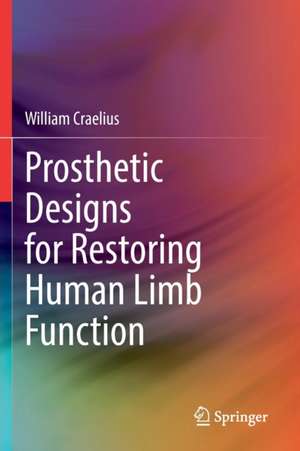Prosthetic Designs for Restoring Human Limb Function
Autor William Craeliusen Limba Engleză Paperback – 31 iul 2022
- Learning enhanced by the exercises, including physical modeling with MATLAB and Simulink;
- Includes appendices with relevant equations and parameters for reference;
- Introduction to the design and engineering of prosthetics and assistive technologies.
| Toate formatele și edițiile | Preț | Express |
|---|---|---|
| Paperback (1) | 468.25 lei 6-8 săpt. | |
| Springer International Publishing – 31 iul 2022 | 468.25 lei 6-8 săpt. | |
| Hardback (1) | 700.29 lei 6-8 săpt. | |
| Springer International Publishing – 31 iul 2021 | 700.29 lei 6-8 săpt. |
Preț: 468.25 lei
Preț vechi: 550.88 lei
-15% Nou
Puncte Express: 702
Preț estimativ în valută:
89.61€ • 93.44$ • 74.47£
89.61€ • 93.44$ • 74.47£
Carte tipărită la comandă
Livrare economică 20 martie-03 aprilie
Preluare comenzi: 021 569.72.76
Specificații
ISBN-13: 9783030310790
ISBN-10: 3030310795
Pagini: 224
Ilustrații: XIII, 224 p. 102 illus., 101 illus. in color.
Dimensiuni: 155 x 235 x 19 mm
Greutate: 0.34 kg
Ediția:1st ed. 2022
Editura: Springer International Publishing
Colecția Springer
Locul publicării:Cham, Switzerland
ISBN-10: 3030310795
Pagini: 224
Ilustrații: XIII, 224 p. 102 illus., 101 illus. in color.
Dimensiuni: 155 x 235 x 19 mm
Greutate: 0.34 kg
Ediția:1st ed. 2022
Editura: Springer International Publishing
Colecția Springer
Locul publicării:Cham, Switzerland
Cuprins
Chapter 1. Introduction.- Chapter 2. Biomechanical Fundamentals.- Chapter 3. Biomechanical Measurements.- Chapter 4. Restoring the Lower Limb.- Chapter 5. Energetics of Gait.- Chapter 6. Human- Machine Interface.- Chapter 7. Prosthetic Control.- Chapter 8. Limb-Prosthetic Interface.- Chapter 9. Upper-limb Function.- Chapter 10. Advancing Prosthetic Designs.
Notă biografică
William Craelius, Ph.D, is currently Professor of Biomedical Engineering at Rutgers University. He received a B.S. in Mechanical Analysis and Design from the University of Illinois, and a Ph.D. in Biomedical Engineering from Northwestern University. He did Postdoctoral research at Stanford University in Neuroscience. At Rutgers, he co-founded the first M.S. degree program in Prosthetics. He holds seven U.S. patents and has authored 62 peer-reviewed publications in the field of Biomedical Engineering, and developed a dexterous prosthetic hand, as seen in international media.
Textul de pe ultima copertă
This textbook provides a thorough introduction and overview of the design and engineering of state-of-the-art prosthetics and assistive technologies. Innovations in prosthetics are increasingly made by cross-disciplinary thinking, and the author introduces the application of biomedical, mechanical, electrical, computer, and materials engineering principles to the design of artificial limbs. Coverage includes the fundamentals of biomechanics, biomechanical modeling and measurements, the basics of anatomy and physiology of limb defects, and the historical development of prosthetic design. This book stimulates the innovative thinking necessary for advancing limb restoration, and will be essential reading for students, as well as researchers, professional engineers and prosthetists, involved in the design and manufacture of artificial limbs.
- Learning enhanced by the exercises, including physical modeling with MATLAB and Simulink;
- Includes appendices with relevant equations and parameters for reference;
- Introduction to the design and engineering of prosthetics and assistive technologies.
Caracteristici
Learning enhanced by the exercises, including physical modeling with Matlab/Simulink Includes appendices with relevant equations and parameters for reference Introduction to the design and engineering of prosthetics and assistive technologies
